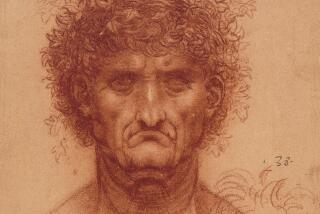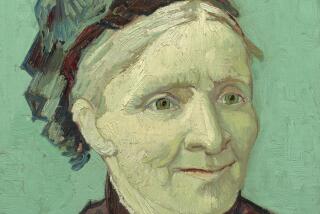BOOK REVIEW : Reflections and Sketches of Rome in ‘40s and Beyond : THE VIA VENETO PAPERS, <i> by Ennio Flaiano</i> , Marlboro Press $21.95; 251 pages
- Share via
To read the late Ennio Flaiano is to imagine a bust of Ovid or Martial, placed in a piazza in Rome and smiling above a traffic jam. In his antic, melancholy irony, Flaiano wrote as if he were time itself, satirizing the present moment.
Flaiano, who died in 1972, produced novels and sketches, and he was Federico Fellini’s co-writer in “La Strada,” “La Dolce Vita” and “8 1/2,” among others. Readers of this collection may be reminded of Fellini; more to the point, they will realize how much of Flaiano was in the films.
“The Via Veneto Papers” is an English translation of short pieces that originally appeared under a title roughly approximating “The Solitude of the Satirist.” That more nearly suggests the cutting and faintly absurdist quality of Flaiano’s satire, and its stoic balance of reflection and lament.
“Veneto,” though, marks the author’s entirely Roman character; one he shared with Fellini.
The book’s first section is a series of sketches that suggest the transformation of Rome from the ‘40s to the ‘60s. The Via Veneto, once a quiet spot where artists and writers would gather in a shabby cafe, has become the glittering crossroads of the new wealth and decadence.
Flaiano’s image is unexpected and effective. With its line of expensive cafes, each with its own colored umbrellas, the street resembles a beach resort. The crowds drift “with the indolence of seaweed,” he writes, and their talk is beach talk “concerned exclusively with gastro-sexual reality.”
Amid the sleek seals, he places a walrus. The poet Cardarelli stands for the Old Rome. Wrapped in an overcoat even in July, he sits all day in the Cafe Strega where, as winner of the coveted Strega Prize years earlier, he still gets reduced rates. To attend literary parties, he borrows a waiter’s tux. Modernity finally overcomes him: He dies of bronchitis contracted after eating ice cream.
From a reference to Flaiano’s work with Fellini, we learn the origin of paparazzi . Looking for a term for the ubiquitously intrusive photographers in “La Dolce Vita,” he recalls a flighty character named Paparazzo in a book of Italian travel sketches by George Gissing.
Later, he writes of the Italian film industry’s tendency to quickly turn out popular movies on each latest society and sex scandal.
It is not vice they portray, so much as emptiness, he writes.
Referring to a contemporary case in which an aristocratic couple, center of a tangle of drugs and sex, is found murdered, he tells us that only one detail interested him. The count had gone hunting that morning and shot 183 ducks. This is not what tragedy is made of, he objects.
“One single wild duck had been enough for Ibsen to write one of his finest plays, one single dead sea gull enabled Chekhov to give us his masterpiece. But 183 ducks? How can we justify them?”
Flaiano pillories the fashionable extremisms of the time.
After Jean-Paul Sartre made a contorted argument that Khrushchev’s celebrated denunciation of Stalin’s atrocities “objectively” strengthened totalitarian tendencies, he writes that Sartre’s existence “has been spent joining and leaving the Communist Party. He’s the little man with the umbrella of certain barometers that indicate, thereby, if we’re in for good or bad weather.”
As for neo-Fascism, he writes that it is a stopped clock that is right twice a day.
“It is a question of a moment. But in that moment it shouts: ‘Right on the dot’--and everything ends there.” And “time doesn’t stop moving.”
He notes the instant expertise of the press. A scientist is quoted on an outbreak of flu: “The best way to fight the epidemic is to stay healthy.”
He rebukes the press’s tendency to over-dramatize; instead of writing “problem,” why not write “mania”?
Thus: “There are the problems of political parties and the manias of schools of thought. The problems of democracy and the manias of demagogy. Traffic problems are submerged in the collective mania for always being everywhere at once.”
Some of the collection has inevitably lost its flavor. A satiric stance can be like a single fixed camera filming a parade; and Flaiano’s parade took place three decades ago. But time and again, his temporal irony turns timeless; most often, perhaps, when it is mournful.
He attended a dinner in the 1950s given by Italy’s President Luigi Einaudi for a few writer friends. An intellectual and man of no pretense, Einaudi remarked that his dessert pear was too big and asked if anyone would share it. Flaiano volunteered. The major-domo, shocked by such informality, gloweringly bore him the half-pear “as if it were the head of John the Baptist.” And Flaiano adds a reflection that conveys his sense of the world getting worse:
“Here my memories of President Einaudi come to an end. I never again had occasion to see him, a few years later someone else rose to the Presidency, and everybody knows the rest. For Italy it was the beginning of the republic of indivisible pears.”
More to Read
Sign up for our Book Club newsletter
Get the latest news, events and more from the Los Angeles Times Book Club, and help us get L.A. reading and talking.
You may occasionally receive promotional content from the Los Angeles Times.









